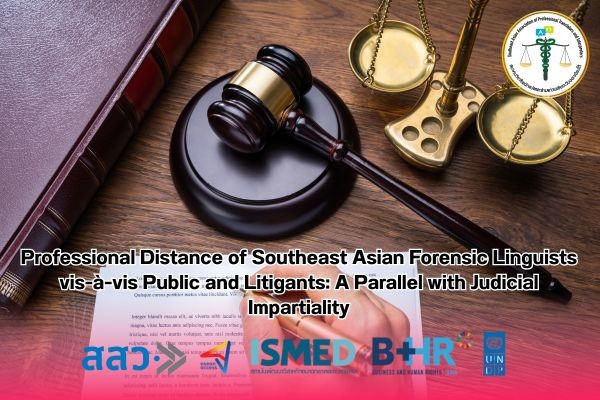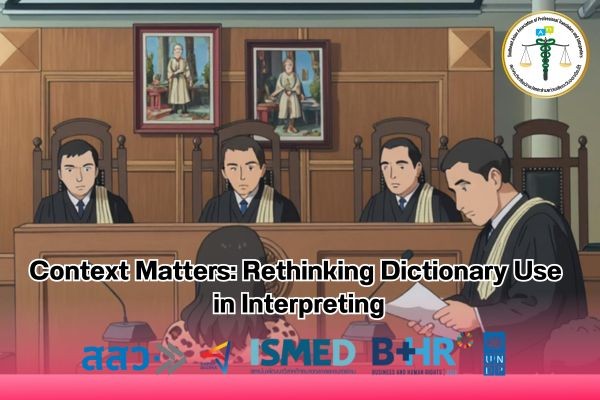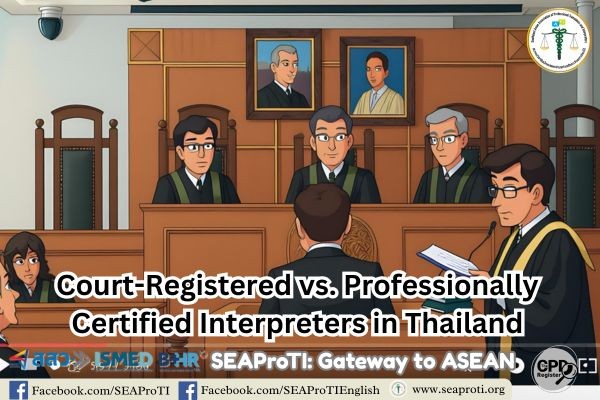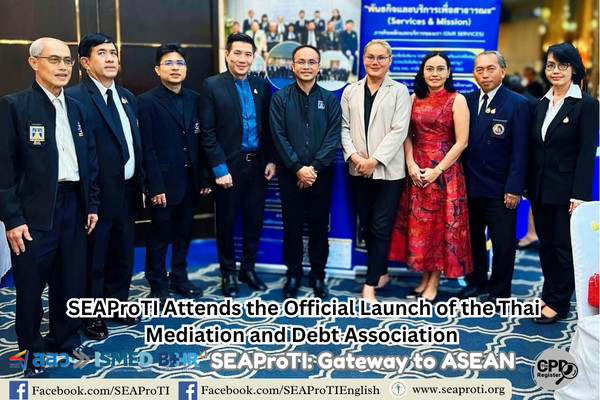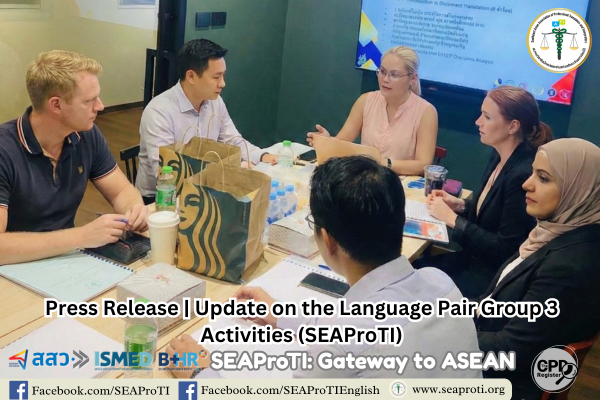Professional Distance of Southeast Asian Forensic Linguists vis-à-vis Public and Litigants:
A Parallel with Judicial Impartiality
Author: Wanitcha Sumanat, the president of the Southeast Asian Association of Professional Translators and Interpreters
6 September 2025, Bangkok – This article examines how forensic linguists certified by the Southeast Asian Association of Professional Translators and Interpreters (SEAProTI) maintain professional distance toward the public and litigants, akin to judicial impartiality. Drawing on ethical frameworks from translation and interpretation associations, the paper analyzes key principles—impartiality, confidentiality, accuracy, and professional integrity—as applied by SEAProTI-certified forensic linguists. The study underscores how these principles reinforce credibility and neutrality in legal contexts, similarly to judicial roles.
Keywords: forensic linguistics, professional distance, impartiality, SEAProTI, ethics, translation associations
In legal proceedings, forensic linguists serve the justice system by providing expert linguistic analysis without aligning with any party. This neutrality is essential to ensure their findings remain credible and impartial. This article explores how SEAProTI-certified forensic linguists preserve such professionalism and compares their ethical responsibilities to those of judges.
SEAProTI and Forensic Linguistics Certification
SEAProTI has established official criteria and internal guidelines for professionals in forensic linguistics, including a registry of certified experts following a workshop held on April 4, 2025. This registry aims to support transparency and serve as a professional reference for stakeholders and the public.
Ethical Principles in Translation and Interpretation
Although specific forensic linguistics ethics under SEAProTI may not be publicly available, established codes from other associations provide a foundation. For instance, the American Translators Association (ATA) emphasizes impartiality, accuracy, confidentiality, and professionalism.
Similarly, the UN’s Code of Ethics for interpreters and translators stresses impartial behavior, integrity, non-interference with personal interest, and confidentiality.
These key principles are equally crucial for forensic linguists:
- Impartiality: Avoiding bias and conflicts of interest.
- Confidentiality: Respecting case-sensitive data.
- Accuracy: Delivering faithful and unspoiled linguistic analysis.
- Professional Integrity: Maintaining credibility and independence.
Professional Distance: Forensic Linguists vs. Judges
| Aspect | Forensic Linguists (SEAProTI) | Judges |
|---|---|---|
| Role | Provide objective linguistic expertise | Make final legal determinations |
| Neutrality | Must remain unbiased toward parties | Must be impartial and fair |
| Confidentiality | Must handle sensitive data discreetly | Must safeguard case information |
| Integrity | Avoid conflicts of interest | Avoid impropriety or external influence |
SEAProTI-certified linguists mirror judges in maintaining professional detachment, ensuring that their analysis serves justice without influencing verdicts.
Discussion
Implementing professional distance fortifies the forensic linguist’s authority in court. By integrating established ethics (from the ATA and UN codes) with SEAProTI’s certification standards, forensic linguists enhance trust and uphold justice. This alignment with judicial principles reinforces their role as impartial expert witnesses rather than advocates for any side.
Conclusion
SEAProTI-certified forensic linguists embody professional distance through impartiality, confidentiality, accuracy, and integrity—paralleling the ethical standards of judges. Such rigor ensures that linguistic expertise contributes to fair and credible judicial outcomes.
References:
- American Translators Association. (n.d.). Code of Ethics and Professional Practice for Translators and Interpreters: Responsibility, Accuracy, Confidentiality, Professionalism. Retrieved from online sources
- International Criminal Tribunal (UN). (2017). Code of Ethics for Interpreters and Translators employed by the Mechanism. UN Mechanism documents
- Southeast Asian Association of Professional Translators and Interpreters (SEAProTI). (2025, April 22). List of Experts in Forensic Linguistics (1/2568). SEAProTI official announcement
About Certified Translators, Translation Certification Providers, and Certified Interpreters of SEAProTI
The Southeast Asian Association of Professional Translators and Interpreters (SEAProTI) has announced the criteria and qualifications for registration of Certified Translators, Translation Certification Providers, and Certified Interpreters of the Association. These criteria were published under Sections 9 and 10 of the Royal Thai Government Gazette, Secretariat of the Cabinet, Office of the Prime Minister, on 25 July 2024, Vol. 141, Part 66 Ng, p. 100. Full text available here: The Royal Thai Government Gazette
** The Office of the Council of State has proposed issuing a Royal Decree stipulating that registered translators—including certification providers from professional associations or accredited language training institutions be legally empowered to certify translations (Letter to SEAProTI dated 28 April 2025).
*** SEAProTI is the first professional association in Thailand and Southeast Asia to establish a formal certification system for Certified Translators, Translation Certification Providers, and Certified Interpreters.
Headquarters: 33 Baan Rajakhru Building, Room 402, Soi Phahonyothin 5, Phahonyothin Road, Phayathai Sub-district, Phayathai District, Bangkok 10400, Thailand
Email: hello@seaproti.com Phone: (+66) 2-114-3128 (Office Hours: Monday–Friday, 09:00–17:00)
ระยะห่างเชิงวิชาชีพ (Professional Distance) ของผู้เชี่ยวชาญด้านนิติภาษาศาสตร์ในเอเชียตะวันออกเฉียงใต้:
การเปรียบเทียบกับความเป็นกลางของผู้พิพากษา
ผู้เขียน วณิชชา สุมานัส นายกสมาคมวิชาชีพนักแปลและล่ามแห่งเอเชียตะวันออกเฉียงใต้
6 กันยายน 2568, กรุงเทพมหานคร – บทความนี้ศึกษาการรักษา ระยะห่างเชิงวิชาชีพ (Professional Distance) ของผู้เชี่ยวชาญด้านนิติภาษาศาสตร์ (Forensic Linguists) ภายใต้การรับรองของสมาคมวิชาชีพนักแปลและล่ามแห่งเอเชียตะวันออกเฉียงใต้ (SEAProTI) โดยเปรียบเทียบกับหลักความเป็นกลางของผู้พิพากษาในการพิจารณาคดี บทความวิเคราะห์หลักจริยธรรมที่สำคัญ ได้แก่ ความเป็นกลาง (Impartiality) ความลับ (Confidentiality) ความถูกต้อง (Accuracy) และความซื่อสัตย์ทางวิชาชีพ (Integrity) เพื่อชี้ให้เห็นถึงบทบาทของผู้เชี่ยวชาญด้านภาษาในกระบวนการยุติธรรมที่ต้องรักษาความน่าเชื่อถือเช่นเดียวกับตุลาการ
คำสำคัญ: นิติภาษาศาสตร์, ระยะห่างเชิงวิชาชีพ, ความเป็นกลาง, SEAProTI, จริยธรรมวิชาชีพ, การแปลและการล่าม
ในกระบวนการยุติธรรม ผู้เชี่ยวชาญด้านนิติภาษาศาสตร์มีบทบาทสำคัญในการให้ความเห็นเชิงภาษาศาสตร์โดยไม่เข้าข้างฝ่ายใดฝ่ายหนึ่ง ความเป็นกลางดังกล่าวถือเป็นหัวใจที่ทำให้งานวิเคราะห์ได้รับการยอมรับในฐานะหลักฐานเชิงวิชาการต่อศาล บทความนี้มุ่งวิเคราะห์ว่าผู้เชี่ยวชาญด้านนิติภาษาศาสตร์ที่ได้รับการรับรองจาก SEAProTI รักษาระยะห่างเชิงวิชาชีพอย่างไร และเปรียบเทียบกับความเป็นกลางของผู้พิพากษา
SEAProTI และการรับรองผู้เชี่ยวชาญด้านนิติภาษาศาสตร์
SEAProTI ได้กำหนดเกณฑ์การรับรองผู้เชี่ยวชาญด้านนิติภาษาศาสตร์อย่างเป็นทางการ และเผยแพร่รายชื่อผู้เชี่ยวชาญชุดแรกเมื่อวันที่ 4 เมษายน 2568 เพื่อใช้เป็นฐานข้อมูลอ้างอิงแก่หน่วยงานรัฐ เอกชน และสาธารณชน (SEAProTI, 2025) การสร้างระบบรับรองดังกล่าวช่วยเพิ่มความโปร่งใสและมาตรฐานในวงการวิชาชีพ
หลักจริยธรรมของการแปลและการล่าม
แม้ SEAProTI จะยังไม่ประกาศ “จรรยาบรรณเฉพาะ” สำหรับนิติภาษาศาสตร์ แต่สามารถอ้างอิงจากมาตรฐานสากล เช่น จรรยาบรรณของสมาคมนักแปลแห่งอเมริกา (ATA) และจรรยาบรรณของสหประชาชาติสำหรับล่ามและนักแปล ซึ่งมีสาระสำคัญร่วมกันคือ
- ความเป็นกลาง (Impartiality): ไม่แสดงอคติและหลีกเลี่ยงผลประโยชน์ทับซ้อน
- การรักษาความลับ (Confidentiality): ปกป้องข้อมูลที่เกี่ยวข้องกับคดี
- ความถูกต้อง (Accuracy): วิเคราะห์และถ่ายทอดข้อมูลทางภาษาอย่างตรงไปตรงมา
- ความซื่อสัตย์ทางวิชาชีพ (Integrity): ดำรงความน่าเชื่อถือโดยไม่ยอมให้ผลประโยชน์ภายนอกมีอิทธิพล
การเปรียบเทียบกับผู้พิพากษา
| มิติ | ผู้เชี่ยวชาญนิติภาษาศาสตร์ (SEAProTI) | ผู้พิพากษา |
|---|---|---|
| บทบาท | ให้ความเห็นเชิงภาษาศาสตร์เพื่อศาล | พิจารณาพิพากษาคดีตามกฎหมาย |
| ความเป็นกลาง | ไม่เอนเอียงต่อคู่ความ | ยึดหลักยุติธรรมและความเสมอภาค |
| ความลับ | เก็บรักษาข้อมูลทางภาษาอย่างเข้มงวด | รักษาข้อมูลคดีไม่ให้รั่วไหล |
| ความซื่อสัตย์ | ไม่รับผลประโยชน์ที่อาจก่อให้เกิดอคติ | หลีกเลี่ยงการกระทำที่ทำลายศรัทธา |
การเปรียบเทียบดังกล่าวชี้ให้เห็นว่า ผู้เชี่ยวชาญด้านนิติภาษาศาสตร์ต้องรักษาระยะห่างเชิงวิชาชีพในลักษณะเดียวกับผู้พิพากษา เพื่อให้กระบวนการยุติธรรมดำเนินไปด้วยความน่าเชื่อถือ
อภิปราย
การสร้างระยะห่างเชิงวิชาชีพไม่ได้เป็นเพียงมาตรการเชิงจริยธรรมเท่านั้น แต่ยังเป็นการเสริมสร้างความน่าเชื่อถือให้กับผู้เชี่ยวชาญในฐานะพยานผู้ทรงคุณวุฒิ เมื่อผู้เชี่ยวชาญอธิบายข้อเท็จจริงเชิงภาษาศาสตร์อย่างโปร่งใส โดยไม่โน้มเอียงไปข้างใด จะช่วยให้ศาลสามารถใช้ข้อมูลดังกล่าวประกอบการพิจารณาได้อย่างยุติธรรม
สรุป
ผู้เชี่ยวชาญด้านนิติภาษาศาสตร์ภายใต้การรับรองของ SEAProTI จำเป็นต้องดำรง Professional Distance ผ่านการรักษาความเป็นกลาง ความลับ ความถูกต้อง และความซื่อสัตย์ทางวิชาชีพ ซึ่งสะท้อนบทบาทคล้ายคลึงกับผู้พิพากษาในการธำรงไว้ซึ่งความยุติธรรม
บรรณานุกรม
- American Translators Association. (n.d.). Code of Ethics and Professional Practice for Translators and Interpreters: Responsibility, Accuracy, Confidentiality, Professionalism.
- International Criminal Tribunal (UN). (2017). Code of Ethics for Interpreters and Translators employed by the Mechanism.
- Southeast Asian Association of Professional Translators and Interpreters (SEAProTI). (2025, April 22). List of Experts in Forensic Linguistics (1/2568).
เกี่ยวกับนักแปลรับรอง ผู้รับรองการแปล และล่ามรับรองของสมาคมวิชาชีพนักแปลและล่ามแห่งเอเชียตะวันออกเฉียงใต้
* สมาคมวิชาชีพนักแปลและล่ามแห่งเอเชียตะวันออกเฉียงใต้ (SEAProTI) ได้ประกาศหลักเกณฑ์และคุณสมบัติผู้ที่ขึ้นทะเบียนเป็น “นักแปลรับรอง (Certified Translators) และผู้รับรองการแปล (Translation Certification Providers) และล่ามรับรอง (Certified Interpreters)” ของสมาคม หมวดที่ 9 และหมวดที่ 10 ในราชกิจจานุเบกษา ของสำนักเลขาธิการคณะรัฐมนตรี ในสำนักนายกรัฐมนตรี แห่งราชอาณาจักรไทย ลงวันที่ 25 ก.ค. 2567 เล่มที่ 141 ตอนที่ 66 ง หน้า 100 อ่านฉบับเต็มได้ที่: นักแปลรับรอง ผู้รับรองการแปล และล่ามรับรอง
** สำนักคณะกรรมการกฤษฎีกาเสนอให้ตราเป็นพระราชกฤษฎีกา โดยกำหนดให้นักแปลที่ขึ้นทะเบียน รวมถึงผู้รับรองการแปลจากสมาคมวิชาชีพหรือสถาบันสอนภาษาที่มีการอบรมและขึ้นทะเบียน สามารถรับรองคำแปลได้ (จดหมายถึงสมาคม SEAProTI ลงวันที่ 28 เม.ย. 2568)
*** สมาคมวิชาชีพนักแปลและล่ามแห่งเอเชียตะวันออกเฉียงใต้ เป็นสมาคมวิชาชีพแห่งแรกในประเทศไทยและภูมิภาคเอเชียตะวันออกเฉียงใต้ที่มีระบบรับรองนักแปลรับรอง ผู้รับรองการแปล และล่ามรับรอง
สำนักงานใหญ่: อาคารบ้านราชครู เลขที่ 33 ห้อง 402 ซอยพหลโยธิน 5 ถนนพหลโยธิน แขวงพญาไท เขตพญาไท กรุงเทพมหานคร 10400 ประเทศไทย
อีเมล: hello@seaproti.com โทรศัพท์: (+66) 2-114-3128 (เวลาทำการ: วันจันทร์–วันศุกร์ เวลา 09.00–17.00 น.)


